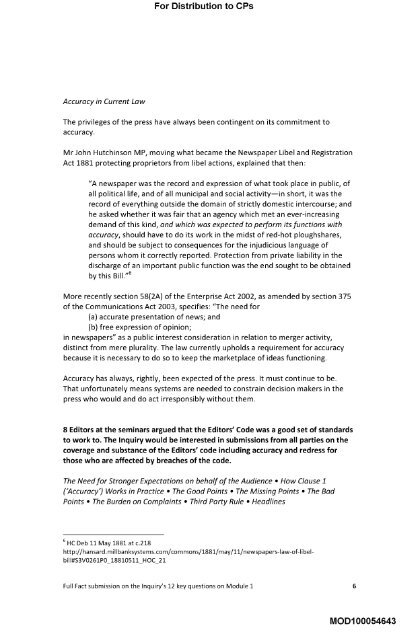Third Submission by Full Fact - The Leveson Inquiry
Third Submission by Full Fact - The Leveson Inquiry
Third Submission by Full Fact - The Leveson Inquiry
You also want an ePaper? Increase the reach of your titles
YUMPU automatically turns print PDFs into web optimized ePapers that Google loves.
Accuracy in Current Law<br />
For Distribution to CPs<br />
<strong>The</strong> privileges of the press have always been contingent on its commitment to<br />
accuracy.<br />
Mr John Hutchinson MP, moving what became the Newspaper Libel and Registration<br />
Act 1881 protecting proprietors from libel actions, explained that then:<br />
"A newspaper was the record and expression of what took place in public, of<br />
all political life, and of all municipal and social activity--in short, it was the<br />
record of everything outside the domain of strictly domestic intercourse; and<br />
he asked whether it was fair that an agency which met an ever-increasing<br />
demand of this kind, and which was expected to perform its functions with<br />
accuracy, should have to do its work in the midst of red-hot ploughshares,<br />
and should be subject to consequences for the injudicious language of<br />
persons whom it correctly reported. Protection from private liability in the<br />
discharge of an important public function was the end sought to be obtained<br />
<strong>by</strong> this Bill. "6<br />
More recently section 58(2A) of the Enterprise Act 2002, as amended <strong>by</strong> section 375<br />
of the Communications Act 2003, specifies: "<strong>The</strong> need for<br />
(a) accurate presentation of news; and<br />
(b) free expression of opinion;<br />
in newspapers" as a public interest consideration in relation to merger activity,<br />
distinct from mere plurality. <strong>The</strong> law currently upholds a requirement for accuracy<br />
because it is necessary to do so to keep the marketplace of ideas functioning.<br />
Accuracy has always, rightly, been expected of the press. It must continue to be.<br />
That unfortunately means systems are needed to constrain decision makers in the<br />
press who would and do act irresponsibly without them.<br />
8 Editors at the seminars argued that the Editors’ Code was a good set of standards<br />
to work to. <strong>The</strong> <strong>Inquiry</strong> would be interested in submissions from all parties on the<br />
coverage and substance of the Editors’ code including accuracy and redress for<br />
those who are affected <strong>by</strong> breaches of the code.<br />
<strong>The</strong> Need for Stronger Expectations on behalf of the Audience ¯ How Clause 1<br />
(’Accuracy’) Works in Practice ¯ <strong>The</strong> Good Points ¯ <strong>The</strong> Missing Points ¯ <strong>The</strong> Bad<br />
Points ° <strong>The</strong> Burden on Complaints ° <strong>Third</strong> Party Rule ° Headlines<br />
6 HC Deb 11 May 1881 at c.218<br />
http://hansard.millbanksystems.com/commons/1881/may/11/newspapers-law-of-libelbilI#S3VO261PO<br />
18810511 HOC 21<br />
<strong>Full</strong> <strong>Fact</strong> submission on the <strong>Inquiry</strong>’s 12 key questions on Module 1<br />
MOD100054643
















